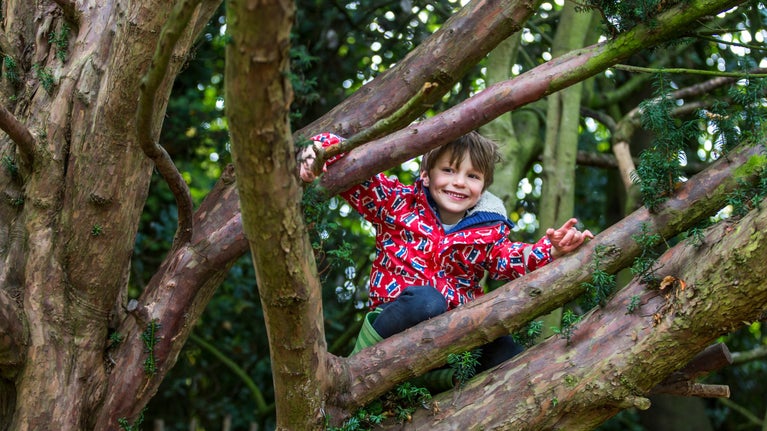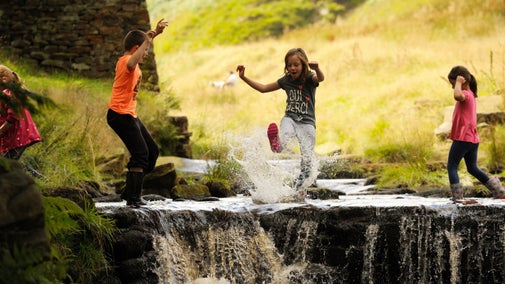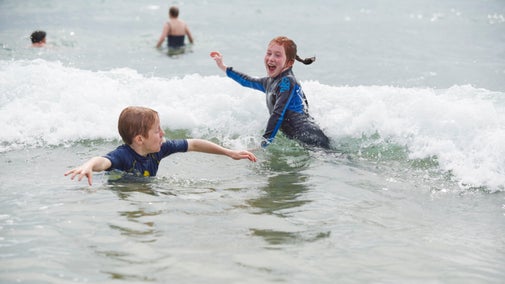
‘50 things to do before you're 11¾’
Have fun exploring nature and the great outdoors with our list of ‘50 things to do before you're 11¾’.

Spotting fish is one of the best ways to spend time on the seaside, or when you're exploring water in the countryside. It's tricky though, with the fish darting around and trying to avoid you. We've put together some ideas to make sure you can master no. 8 of our ‘50 things to do before you're 11¾’ in no time.
Wild fish love to swim in fresh or salt water in the sea, rivers, canals, lakes and streams. Look for a spot close to your home, or why not wait until you go on holiday to do this challenge? Wherever you choose for your adventure, make sure you check with an adult before you go and take extra care around the water.
If you want to spot a fish, you'll need to be patient while you wait. And if you want to catch the fish to have a closer look, you’ll need to be very quick!
It’s fun to watch how a fish moves, as it swims and plays with its friends. Some are speedy, while others prefer a slow and steady glide. Watch the water for little bubbles and ripples as the fish come to the surface.
Fish tend to feed early or late in the day, so these are good times to search. Around midday, however, you'll find them easier to see because the sun is overhead. Wearing sunglasses can also help, as the sun causes glare on the water, making it difficult to look below the surface. You may find you have to wait for what feels like forever to spot a fish, but the feeling you get when you do will be worth it.
You’ve caught a fish! Now it’s time to take a closer look. How big is it? What markings does it have? Try to imagine what it might feel like (but don’t actually touch it). Does it smell at all? You could start your own fish spotting scrap book and add photos, notes and drawings of all the fish you find.
If you have a special fish spotter sheet with you or do some research on common fish in your location, you might even be able to learn your finned friend's name. You'll need to be a bit careful as some fish are poisonous, like wrasse and weever fish but most are harmless, especially if you don’t touch them with your hands.
If you're fishing with a net in a stream, then look carefully in your net as you may have teeny-tiny fish like sticklebacks or minnows at the bottom, which are difficult to spot straightaway.

If you catch a fish, don’t forget they need to be in water to stay alive. After you’ve taken a quick look at your fish, put it back into the water carefully so it can swim off home again.
If you want to transfer the fish to a container to have a longer look at it, then it's best to use the same water (at the same temperature) as the place where the fish came from in your container. And please don't leave your fish out in the sun to get hot.
If possible, avoid handling your new fishy friend completely. Don't feed the fish either – all the food it needs will be wherever it lives.
The fish will be much happier if you can pop it back in its original home, so it can swim off again, within half an hour.

Have fun exploring nature and the great outdoors with our list of ‘50 things to do before you're 11¾’.
To ensure you can complete your ‘50 things to do before you’re 11¾’ activities safely, here are some top tips to help you complete your challenges with safety in mind.

Download the full ‘50 things to do before you’re 11¾’ activity list.
Whether you're by the sea or at a stream, lake or river, there are a number of ‘50 things to do before you’re 11¾’ activities you can enjoy, but paddling is one of the most fun.

Swimming in the sea, no. 42 of our ‘50 things to do before you’re 11¾’, is a brilliant experience. Follow our tips to help you have the best time.

Discover the world of waterways and the wildlife that call it home in our special episode of the National Trust Kids’ Podcast. Visit our podcast page to meet Ranger Rae and her band of animal heroes.
